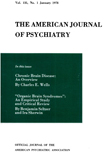Decreased 24-hour urinary MHPG in childhood autism
Abstract
The authors compared a group of boys with childhood autism and a group of normal boys of similar age and found a decrease in urinary 3-methoxy- 4-hydroxyphenethylene glycol (MHPG) in the autistic group. They hypothesize that autistic children might have an alteration in central and peripheral noradrenergic function, which might be related to impaired regulation of attention, arousal, and anxiety.
Access content
To read the fulltext, please use one of the options below to sign in or purchase access.- Personal login
- Institutional Login
- Sign in via OpenAthens
- Register for access
-
Please login/register if you wish to pair your device and check access availability.
Not a subscriber?
PsychiatryOnline subscription options offer access to the DSM-5 library, books, journals, CME, and patient resources. This all-in-one virtual library provides psychiatrists and mental health professionals with key resources for diagnosis, treatment, research, and professional development.
Need more help? PsychiatryOnline Customer Service may be reached by emailing [email protected] or by calling 800-368-5777 (in the U.S.) or 703-907-7322 (outside the U.S.).



